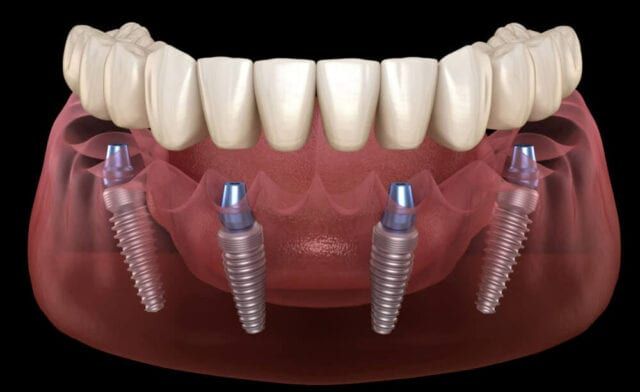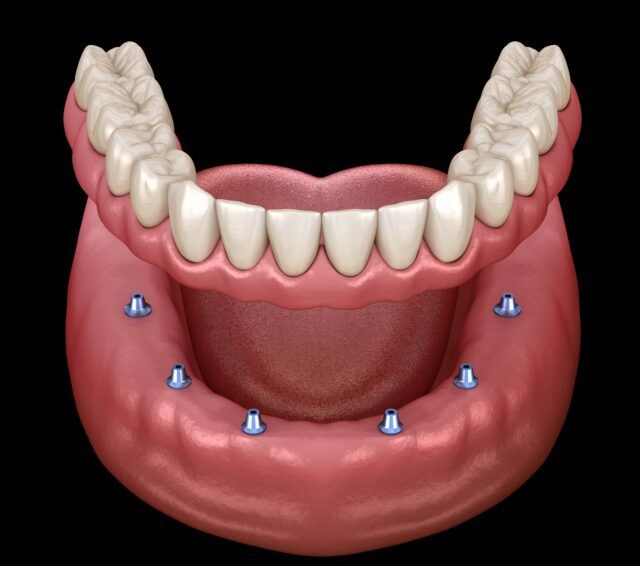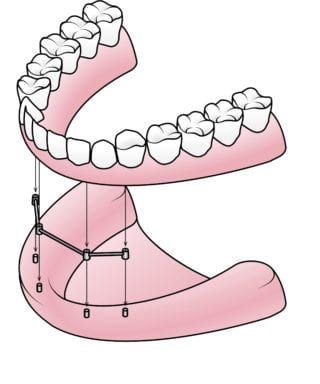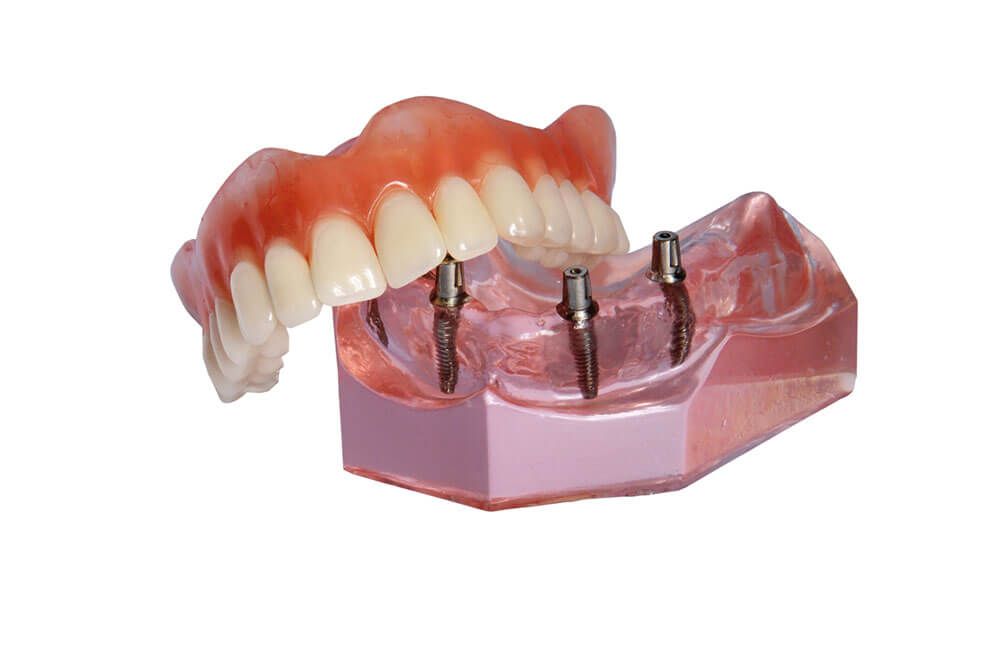Edentulism, the complete loss of natural teeth, is a dental condition that can significantly impact a person’s oral health, overall well-being, and self-confidence. Fortunately, advancements in modern dentistry have provided individuals with a range of effective solutions to restore their smiles and regain oral function. Among these solutions, implant-supported dentures have emerged as a remarkable option for those with a mouthful of missing teeth. By utilizing dental implants as stable anchors, different types of implant-supported dentures offer a lifelike, secure, and functional alternative to traditional dentures. In this article, we will explore how various types of implant-supported dentures can be used as a solution for individuals suffering from edentulism, providing them with renewed comfort, confidence, and quality of life.
Why Choose Implant-Supported Dentures?
Implant-supported dentures offer several compelling reasons to consider them as a tooth replacement option. Here are some key reasons:
Enhanced Stability:
Unlike traditional dentures that may slip or move during speaking or eating, implant-supported dentures are firmly anchored to dental implants surgically placed in the jawbone. This provides exceptional stability, allowing individuals to enjoy their favorite foods, speak with confidence, and engage in social interactions without worrying about denture movement.
Improved Chewing Efficiency:
With implant-supported dentures, chewing efficiency is significantly enhanced. The strong and secure attachment to the implants allows for better biting force distribution, enabling individuals to comfortably chew a wider range of foods. This promotes proper digestion and nutrition.
Natural Look and Feel:
Implant-supported dentures are designed to closely resemble natural teeth, both in appearance and function. The dentures are customized to match the shape, color, and alignment of your existing teeth, providing a natural and aesthetically pleasing smile. Additionally, the stability and secure fit of implant-supported dentures give a more natural feel compared to traditional removable dentures.
Preserves Jawbone Health:
When natural teeth are lost, the jawbone begins to deteriorate due to lack of stimulation. Dental implants used in implant-supported dentures integrate with the jawbone, stimulating it and preventing further bone loss. This helps maintain the shape and density of the jawbone, preserving facial structure and preventing a sunken or aged appearance.
Long-Term Durability:
With proper care and maintenance, implant-supported dentures can last for many years, offering long-term durability and reliability. The materials used in the construction of these dentures, along with the stable foundation provided by dental implants, contribute to their longevity.
Improved Quality of Life:
The stability, comfort, and natural appearance of implant-supported dentures can significantly improve an individual’s quality of life. They restore the ability to eat a wide variety of foods, speak clearly, and smile confidently. This can enhance self-esteem, social interactions, and overall well-being.
Convenience and Easy Maintenance:
Implant-supported dentures eliminate the need for messy adhesives or pastes commonly used with traditional dentures. They are easy to clean, and regular oral hygiene practices, such as brushing and flossing, can be maintained as with natural teeth.
Treatment Personalization:
Implant-supported dentures can be customized to meet each individual’s specific needs. Whether it’s the type of denture (fixed or removable) or the number and placement of dental implants, the treatment can be tailored to provide the best possible outcome for each patient.
Overall, implant-supported dentures offer a comprehensive solution for those with a mouthful of missing teeth, providing stability, improved function, natural aesthetics, and long-term satisfaction. Consultation with a dental professional can help determine if implant-supported dentures are the right choice for your specific situation and oral health needs.
Different Types of Implant-Supported Dentures:
- All-on-Four (All-on-4)
- Implant-retained Overdentures
- Bar-retained Dentures
All-on-4 Dentures:
All-on-Four dentures, also known as “teeth in a day” or “full-arch implant-supported dentures,” are an innovative dental solution for individuals who have lost all or most of their teeth and require a full set of dentures. This technique involves anchoring a complete arch of dentures onto four strategically placed dental implants in the jawbone.

The name “All-on-Four” refers to the use of four dental implants to support the entire arch of dentures. These implants are strategically positioned in areas of the jawbone that offer the most stability and bone support. The implants act as sturdy anchors for the dentures, eliminating the need for adhesives or pastes to hold them in place.
During an all-on-four implant procedure, four dental implants are surgically placed in the jawbone. The implants are typically tilted at specific angles to maximize stability and utilize available bone. Immediately after implant placement, a temporary set of dentures is attached to the implants. This allows for immediate functionality, enabling patients to leave the dental office with a functional set of teeth on the same day as the surgery.
Over the following few months, the implants undergo a process called osseointegration. Once the implants have fully integrated with the bone, the temporary dentures are replaced with a permanent, custom-designed set of dentures.
Benefits of All-on-4 Dentures:
- Rapid results and immediate functionality.
- Enhanced chewing ability and improved speech.
- No slippage or movement, providing confidence during social interactions.
- Preservation of jawbone integrity and facial aesthetics.
Implant-Retained Overdentures:
Implant-retained overdentures, also known as snap-in dentures, offer an excellent compromise between traditional dentures and a full set of dental implants. This solution involves placing two or more dental implants into the jawbone and attaching a customized denture onto the implants.

The number of implants used can vary depending on individual needs and the level of stability desired. Typically, two to four implants are used for implant-retained overdentures. The implants will be inserted into the jawbone at strategic locations, based on the treatment plan.
After implant placement, a healing period of several months is necessary for osseointegration to occur. Once osseointegration is complete, the dentist will attach abutments to the implants. Abutments are connector pieces that protrude above the gum line and serve as attachment points for the denture.
Once the denture is fabricated, it is attached to the abutments using connectors or attachments specifically designed for implant-retained dentures. These attachments allow the denture to securely snap onto the abutments, providing stability and retention.
Benefits of Implant-Retained Overdentures:
- Improved stability and retention, enhancing comfort and confidence.
- Better chewing efficiency and enhanced taste sensation.
- Reduced bone loss, preventing further deterioration of the jawbone.
- Easy maintenance and hygiene, as the dentures can be taken out for cleaning.
Bar-Retained Dentures:
Bar-retained dentures utilize a thin metal bar that is attached to multiple dental implants placed in the jawbone. The denture is then securely fastened to the bar using clips or other attachments. This design provides exceptional stability and support for the dentures, offering a comfortable and secure fit. Bar-retained dentures are an excellent option for patients who have experienced significant bone loss but still desire a removable denture solution.

To place a bar-retained denture, dental implants must be surgically implanted into the jawbone. The number and placement of implants may vary depending on individual needs, bone density, and treatment goals. Typically, four to six implants are used to support the bar. After implant placement, a healing period is required to allow osseointegration to occur.
Once osseointegration is complete, the dental professional will design and fabricate a custom metal bar that follows the contour of the patient’s jawbone. The bar is then attached to the implants using screws or other secure connections. The bar serves as a framework to which the denture will be attached.
The final step involves attaching the denture to the bar using clips, magnets, or other attachment systems. These attachments allow the denture to securely snap onto the bar, providing stability and retention. The denture can be easily removed for cleaning and maintenance.
Benefits of Bar-Retained Dentures:
- Increased stability and reduced denture movement.
- Improved chewing efficiency and speaking ability.
- Even distribution of forces, minimizing strain on the implants and jawbone.
- Easy removal for cleaning and maintenance.
How Different Types of Implant-Supported Dentures Compare:
At a glance, here is how different types of implant-supported dentures compare:
| Feature | All-on-Four Dentures | Implant-Retained Overdentures | Bar-Retained Dentures |
| Treatment Concept | Full arch restoration with four implants | Partial or full arch restoration with two or more implants | Partial or full arch restoration with two or more implants |
| Stability | High | Improved | High |
| Removability | Fixed | Removable | Removable |
| Denture Attachment | Screwed or cemented onto implants | Snaps onto attachments connected to implants | Snaps onto a metal bar attached to implants |
| Number of Implants | Four | Two or more | Two or more |
| Bone Support Requirement | Adequate bone density required | Adequate bone density preferred, but bone grafting may be an option for insufficient bone | Adequate bone density preferred, but bone grafting may be an option for insufficient bone |
| Healing and Integration Time | Several months | Several months | Several months |
| Chewing Efficiency | Excellent | Improved | Improved |
| Jawbone Preservation | Yes | Yes | Yes |
| Maintenance and Cleaning | Fixed, requires professional maintenance and cleaning | Removable for easier cleaning and maintenance | Removable for easier cleaning and maintenance |
| Aesthetics | Natural-looking | Natural-looking | Natural-looking |
| Cost | Higher | Moderate | Moderate to higher |
It’s important to note that the suitability of each denture type can vary depending on individual factors, such as oral health, bone density, and personal preferences. Consulting with a dental professional will provide a comprehensive evaluation and guidance on the most suitable treatment option for your specific needs.
In Conclusion:
Implant-supported dentures have revolutionized the field of restorative dentistry, providing patients with effective solutions for replacing missing teeth. Whether you opt for All-on-4 dentures, implant-retained overdentures, or bar-retained dentures, each type offers unique benefits that cater to different oral health needs. If you are considering implant-supported dentures, it is important to consult with a skilled dental professional who can assess your specific situation and guide you towards the most suitable treatment option. With implant-supported dentures, you can regain your smile, confidence, and quality of life.

